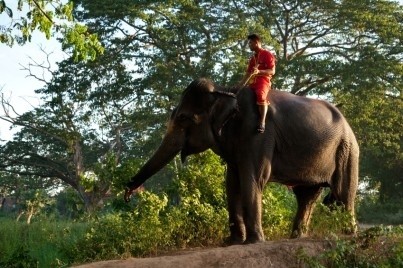
Chiang Mai is home to a large expat community and locals are more than used to sharing their city with foreigners, or farang, as they are referred to. Due to this, the city is well accustomed to Western habits, but do take care to respect local traditions when you come across them.
Thais are very proud people, and although foreigners are widely accepted here, it is important to adhere to a few rules of etiquette. One thing to note is that the royal family is particularly adored in Thailand and it is even rude to point at a picture of the king. Foreigners should also try to avoid losing their tempers in public and showing the soles of their feet to locals. Tipping is generally not necessary, especially in local establishments.
The Thai baht (THB) is the currency here. There are moneychangers in most of the big shopping centers who offer reasonably competitive rates. Many of the big hotels and restaurants accept credit cards as payment, but visitors will need cash if they plan to eat or shop in any smaller, local venues.
Tourists should also be warned that on top of any charges your bank might make for taking out money abroad, ATMs in Thailand also charge an additional fee. Many living and working here, therefore, open up Thai bank accounts to avoid this. ATMs and local banks are plentiful across the city.
Due to its elevated location, the weather in Chiang Mai is quite a bit cooler than that in the rest of Thailand. If you are heading up into the mountains, especially during the winter, be sure to take some warm clothes, as temperatures can drop to below freezing-point at night.
That is not to say that is doesn't get unbearably scorching here in the summer, however, and in the hottest month of April visitors should expect temperatures of up to 100°F. During this period, it is advisable to get accommodation with air conditioning and preferably a swimming pool. The months of September and November are regarded as the most pleasant time to visit for Westerners.
The most common form of transportation in Chiang Mai is the songthaew. These converted, red vans can be flagged down from the side of the road. They act as a cheap alternative to taxis and pick up anyone who is traveling in roughly the same direction. Due to this, they are not always the quickest means of travel but you can get almost anywhere in the city for a very small set price. Buses do run here but they are infrequent and not recommended for tourists.
Tuk-tuk are also in abundance and they are a fun way to travel for small groups of tourists and couples. Locals can negotiate reasonable rates if they are in a hurry, but the drivers will always up the prices for tourists. Haggling is expected, however, so don't feel pressured to accept the starting price.
Yellow taxis are a good mode of transport if you are prepared to pay a little extra for the comfort and air conditioning. If you can persuade the driver to put the journey on the meter, the ride is often cheaper than a tuk-tuk, although achieving this small task is frequently a trial in itself.
Many drivers will also add a starting fee to the price if you are arriving from the airport or a large shopping mall. Regular taxis are the best way to get from Chiang Mai International Airport (CNX) to your hotel.
Population: 240,000
Spoken languages: Thai and Northern dialect
Religions: Buddhism and Islam
Phone/calling code: +66 53